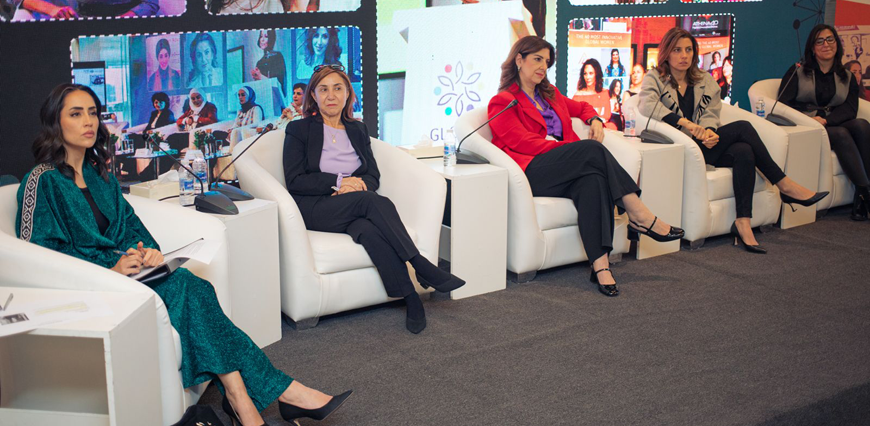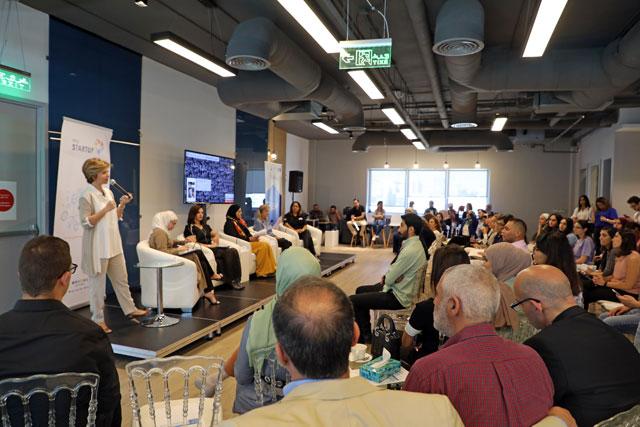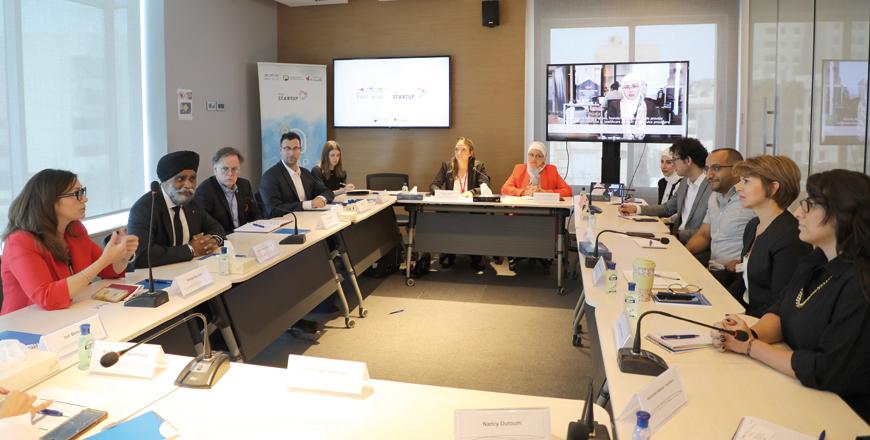You are here
Panel session analyses role of technology in promoting gender equality
By Rayya Al Muheisen - Mar 10,2023 - Last updated at Mar 10,2023

Speaker during a panel session titled ‘Innovation, Technological Change, and Education in the Digital Age’, organised by INJAZ in collaboration with the IRC, in Amman, on Wednesday (Photo courtesy of INJAZ)
AMMAN — Although Jordan has one of the highest numbers of female school and university graduates, it has one of the lowest levels of female workforce enrolment, said the British Ambassador to Jordan Bridget Brind on Wednesday during a panel session.
On the occasion of International Women’s Day, which is celebrated annually on March 8th, INJAZ’s business incubator mySTARTUP in Amman hosted Athena40’s 5th Global Conversation titled “Innovation, Technological Change, and Education in the Digital Age”, which was held in collaboration with the International Rescue Committee (IRC) on Wednesday.
The panel was moderated by Mary Nazzal, founder of 17 Ventures. Maha Bahou, CEO of JoPACC, a payments and clearing company, participated in the panel, along with Dana Suyyagh, CEO of Al Mamlaka TV, Zeena Majali, co-founder of Crystal, the first independent multilingual outsourcing contact centre in Jordan, as well as Reem Al Smeirat, founder of Concepts 4 Automotive Design (CAD).
Panellists discussed the role of technology in promoting gender equality and highlighted the digital divide caused by limited access to technology and unequal distribution of information.
The speakers advocated for creating safe and comfortable work environments, including work-from-home options, to increase women’s participation in the labour market.
“We believe that research, innovation, and change are the grounds to achieve gender equality,” Deema Bibi, INJAZ’s CEO, said during her remarks.
Bibi added that women are under-represented in the technology industry, both in terms of the number of women who work in the field and their representation in leadership positions. Women also experience stereotypes portraying them as less competent or less interested in technology, she noted.
Bibi also said that women are also more likely to have limited access to technology and digital services due to various factors, such as poverty and social norms.
Some women reported facing harassment and cyber abuse when they participate in online spaces, said Bibi.
“Gender divide is the new face of gender inequality in the 21st century,” Nivedita Mogan, the IRC’s country director said in her remarks.
“Although girls now have more access to schools than ever before, less than 30 per cent of women are in STEM [science, technology, engineering and mathematics] majors,” Mogan added.
Meanwhile, the first female British ambassador to Jordan, Bridget Brind, said that women need to be shapers, not consumers of technology.
Brind stated that girls need to acknowledge and realise their value in order to deliver their full potential.
The panel emphasised the need to address discrimination in the tech industry and encourage more women to occupy senior positions and provide access to capital.
The speakers also highlighted the need for innovative solutions to overcome gender inequality in technology and promote equal participation of women in the digital world.
The panel also highlighted the need to increase female content creators in the tech industry to normalise women’s online participation and overcome social constraints.
Overall, the speakers emphasised that technology should be used to promote the greater good and address gender inequalities in the tech industry, along with saying that women should not be excluded from this rapidly growing field.
Related Articles
AMMAN — Leading Jordanian businesswomen gathered at INJAZ’s mySTARTUP business incubator on Saturday for a panel discussion to address chall
AMMAN — The British embassy in Amman is launching a new initiative to give young women in Jordan the chance to experience diplomatic work fi
AMMAN — Canadian Minister of International Development Harjit S.














